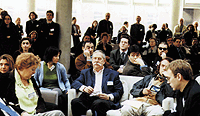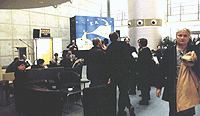European feature animation producers and filmmakers gathered in Potsdam to discuss funding and distribution partnerships and deals. Heikki Jokinen reports on Cartoon's latest coup.

to make feature animation does not seem to have calmed down. This was proven at the Cartoon Movie event at the historical Babelsberg Studios in Potsdam, Germany. The place was well chosen; the first feature animation of all time, Lotte Reiniger's Die Gesichte des Prinzen Achmed(The Adventures of Prince Ahmed, 1926) was created at Babelsberg.
This annual co-financing forum for European feature animation was held March 23 25, 2000 for the second time. In three days 27 projects in development or production were presented. All 350 participants -- including 93 investors and distributors -- also had the opportunity to see six brand new features on the big screen.

Organized by Cartoon, the animation platform for the European Union, Cartoon Movie follows the format of the well-known Cartoon Forum event. Accepted producers have 40 minutes to convince participants to either invest money, or agree to television screenings or a distribution deal for the proposed movie project. Results vary; sometimes the producer will get his financial need fulfilled 100%, sometimes the most visible reaction is yawning. To present a project at Cartoon Movie does not guarantee that one day it will hit the screens.
The event organizers create detailed statistics of the participants attending project presentations. Most popular was the Danish-initiated film Help, I'm a Fish, which attracted 131 professionals. The film, which involves production companies A.Film (Denmark), Münich Animation (Germany), EIV Entertainment (Germany) and Terraglyph (Ireland), is almost finished and will be screened at the Cannes Film Market.

The next projects on the list of attendance were Silver Fox Films' Water Warriors (UK), NDF Hamburg's Derrick - The Animated Movie (Germany), Oniria Production's Tristan and Isolde (Luxemburg), Trixter's Loisel's Peter Pan (Germany), Sparx's The Candelight Circus (France), Futurikon's Malo Korrigan and the Space Tracers (France), Siriol Productions' 360 (UK), Metal Hurlant Productions' Benito Mambo (France) and Entropie Films' The Barrel Organ (France).
Most of the planned films are for children or adolescents, the main consumers of animation. There are, however, some interesting exceptions that break the rules. Absolutely the funniest and perhaps furthest from the mainstream was the French project Teddy's Coming Out.
Hot Projects
Yes, you guessed right. It is a feature animation about the life and struggle of a little homosexual bear, Teddy. He lives in Pretty Wood and really likes his pal Bobby who loves flowers and perfume. Next to the happy village is Wicked Wood, a dreadful place where the horrible Big Bad Wolf lives.
The story is full of perceptive details and humour. It presents a psychologist and a priest as they try to decide who knows what's best for little bears. After a failure in the re-education center for boys Bobby is sent to the Wicked Wood. Which, as you may guess, is not a horrible place but a kind of paradise. For example, when little Bobby waits horrified for the Wolf, a group of animals come along in colourful clothes singing, "YMCA." In the end love overcomes all obstacles and the two hostile communities live in perfect harmony.
"Animals are always made human for movies," says director Philippe Leclerc of Praxinos. "I began to think that they have to have some other kind of life behind the screen, too."
Visually Teddy's Coming Out is made in the now trendy '60s style, with a touch of Tex Avery and Tom of Finland. The backgrounds are simple but effective and colourful. The total budget is only around 6 million Euro or USD. Producer Jean-Paul Caspari says that a big slice of the budget is slated for music. The film will be full of gay cult music, like Doris Day, Gloria Gaynor, Marlene Dietrich, The Village People, and of course, Elvis Presley and Judy Garland.
Director Philippe Leclerc believes that the film will find its audience, as did films like Priscilla, Queen of the Desert. "We do not look to provoke, we want to make a comedy and talk about tolerance," he underlines. "This is not only a gay movie," he adds. This is easy to believe, as the plot sounds truly funny and innovative.

A more mainstream, but most interesting project, is Loisel's Peter Pan by German company Trixter and director Michael Coldewey. Frenchman Regis Loisel is one of the best European comics artists today and he has been working on his five album story Peter Pan for several years. It is loosely based on the well-known book but interpreted in Loisel's sensitive and intelligent manner. The fifth album will be published soon.
Coldewey says he became a fan of Loisel four years ago upon seeing the albums in Paris. "His drawings look like traditional animation, but his way of telling the story is different," Coldewey says. Trixter bought the rights in February and is just beginning the work. In March they didn't yet have a pilot.
Trixter is a German company, based in Munich that specializes in character development and design. They are a strong CGI producer as well. Trixter works together with another German company, Das Werk, that at the moment might well be the biggest European post-production company.
"Now that we have strong support from Das Werk we can start Peter Pan," Coldewey says. Trixter has just finished another feature animation Heavy Metal F.A.K.K.2, a Canadian-German-South Korean film directed by Coldewey and Michael Lemire. It will have its German premiere in May.
"Though Trixter is strong in 3D animation, we will do this in 2D," says producer Lilian Klages. "We try to keep the work in Europe and quality high. At the moment we are discussing cooperation with a Spanish company."

Sounds nice but a cold shower follows. After showing the video with Loisel's images, Coldewey says first of all, of course, that Peter's bad teeth will be redrawn. The reason soon becomes clear: Trixter wants to sell the film to the U.S. market and one cannot have an animated character with bad teeth there -- not even in a film that tells about an extremely poor and neglected slum child of London's East End in the 1880s. Goodbye Dickens and historical facts, hello sleek entertainment with modern dental care.
The paradox is that Loisel didn't want to sell his storys rights to the big U.S. animation company that was interested. He wanted to keep it in European hands. Now the European producer seems to be writing a story that is fit for U.S. cinemas; for a country where practically no foreign films are screened.
"We are currently rewriting the story for family entertainment. We do not use all the parts of the albums," director Coldewey says. According to my judgement, they aim to cut the "sex and nudity" away. The story includes very little of these banned things and they are an integral part. One of the main lines of the original story is the robbing away of childhood with structural and physical violence. Another is the sexual awakening of a young boy. All this Loisel tells with a sensitive style, filled with innocence and understanding.
Coldewey says that Loisel is following the developments and has accepted the changes. "He knows the process and understands that making a film is different than making an album and needs a wider audience."
Loisel was involved with the development of Disney's Tarzan. He was one of the artists figuring out how Tarzan would look. Finally Disney only used the dreadlocks-type hairstyle from his drawings, though they were afraid it would look untidy. Loisel reminded them that Tarzan lives in a jungle with apes; he cannot look as if just walking out of a barbershop.

New Releases
Participants could also see six new feature animations made in Europe. The most fascinating was the Swedish Hundehotellet (Dog Days) by veteran director Per Åhlin, which was released this March in Sweden. The 65-minute film tells of Sture the dog who aims to go to Paris but ends up in a hotel near the heath of Dartmoor.
The story is an intelligent pastiche of traditional British detective stories, with a smart script, which is full of imagination. The story runs slowly, perhaps too slowly for audiences of this millennium, but is hilariously funny.
Unfortunately, the same cannot be said of Heavy Metal F.A.K.K.2. This science-fiction action story is based on the U.S. comic book and is also known as a computer game. The story is straight from the most common cliches of the genre: A man, who is a real bundle of muscles, finds a jewel that gives him supernatural powers and greed for killing and conquering the world. He kills the family of a young surprise, surprise -- big breasted and lightly dressed woman who finally kills him.
The film does not even try to give any kind of psychological background or depth to the characters or their actions. Perhaps the idea is to keep the action so high that the spectator does not have time to think about the story or characters. Well, this simply doesn't work.
In the past a successful animated feature might turn into a family of products, like toys, games, etc. Now the order is being reversed. A successful product or game will become a film using the slight dramaturgy of a computer game for example for an entire plot. But which film will we see in the cinemas around the corner -- Dog Days or Heavy Metal F.A.K.K.2? The answer is so clear it's not even worth guessing.

Entering Theatres Distribution is still one of the major problems for European feature animation. There are in their countries of origin successful animated films, but they do not travel across borders.
An experienced European film producer told me in Potsdam about his new, well made feature animation made for family audiences. When he screened it to the major distributors no one was interested. No cinema would take anything other than Disney, they said. However, the producer didn't give up. He contacted the multiplex cinema owners directly and screened the film for them. Their response was completely different. The cinema owners said that it was exactly the kind of family film they needed for their theaters, but could never get. Now the filmwill open with a major campaign.
To get more visibility for animation in Europe, Cartoon, the organizer of Cartoon Movie, will launch the Cartoon Movie Awards at the third Potsdam meeting next year. Specialized cinema journalists will propose candidates for the merited Animated Film, Producer and Distributor of the year in the area of European animated features. A fourth prize will reward any particularly effective initiative that has attracted wide audience interest.
Heikki Jokinen is a freelance critic and journalist based in Helsinki, Finland. He specializes in comics, short films and animation. He is chairman of the Finnish Art Critics' Association and the former president of ASIFA Nordic, the ASIFA regional body for the five Nordic and three Baltic countries.







